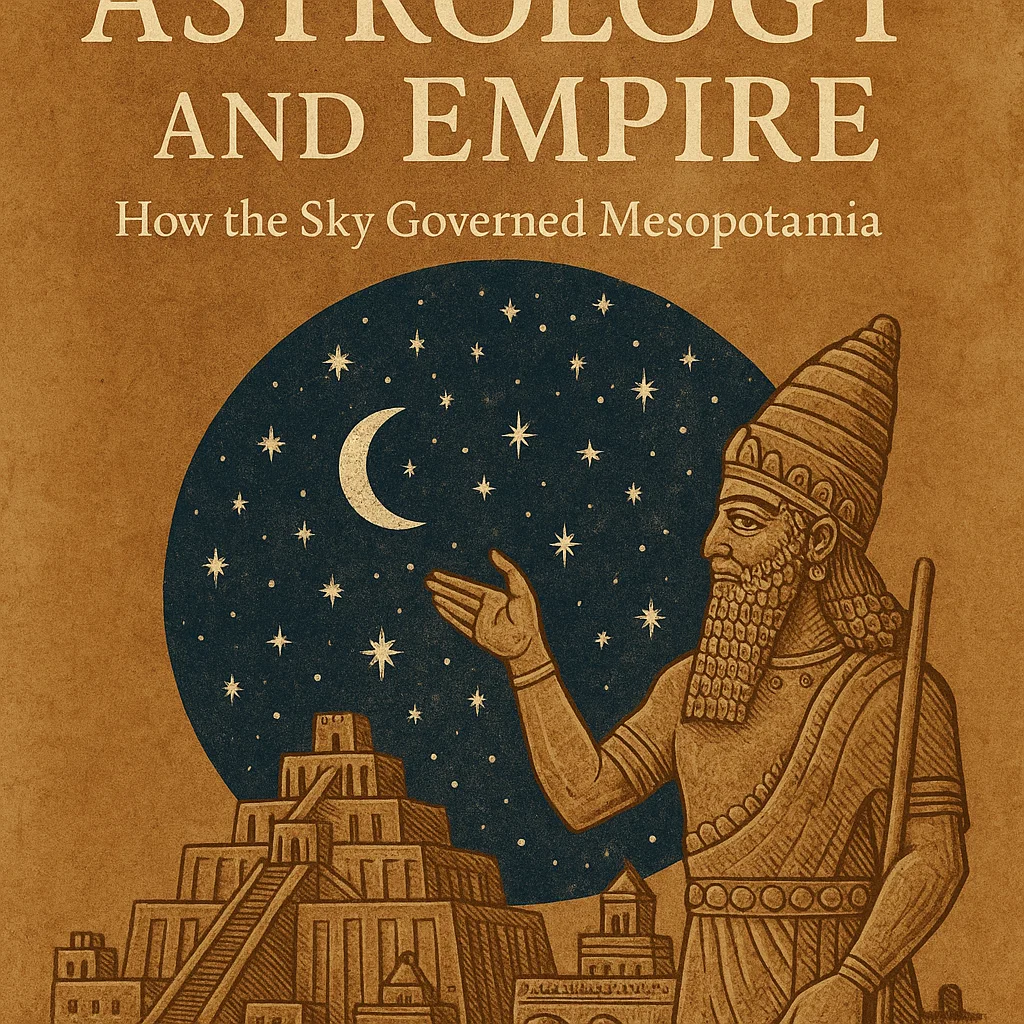When we think of Mesopotamia — the land “between the rivers” Tigris and Euphrates — we often recall the invention of writing, the first laws, and the earliest cities. But another, less discussed foundation of this civilization was its obsession with the sky.
To the Mesopotamians, the heavens were not empty space; they were a divine script. Stars, planets, eclipses, and comets were interpreted as messages from the gods — signs that could decide the fate of empires. Kings relied on court astrologers not only for personal guidance but for the strategic direction of entire states: whether to go to war, when to plant crops, how to respond to floods or famine.
This intertwining of astronomy, astrology, and political authority made Mesopotamia one of the first places in human history where cosmic order shaped earthly power.
Astrology as Statecraft
Unlike today’s personalized horoscopes, Mesopotamian astrology was never about whether an individual would “find love” or “get rich.” It was collective and political — a system designed to safeguard the realm and ensure the legitimacy of the king. The fate of entire cities, harvests, and dynasties was thought to hang on the interpretation of celestial events.
The Role of the Ṭupšarru
At the heart of this system were the ṭupšarru — literally “tablet writers” — who served as the priestly-astrological class. They worked within great temple complexes like those of Babylon, Uruk, and Nineveh, where they meticulously recorded every visible change in the sky. These men were not just mystics but bureaucratic specialists; their clay tablets functioned like early intelligence dossiers, archived and cross-referenced to build predictive models of divine intent.
The Enuma Anu Enlil: A Celestial Codebook
The crown jewel of their scholarship was the Enuma Anu Enlil, a monumental collection of more than 7,000 omens spread across some 70 tablets. It represented centuries of accumulated observation and interpretation.
A few striking examples include:
- Lunar eclipses: Often interpreted as warnings of royal death or regime change. To mitigate the omen, rituals like the substitute king ceremony were enacted, where a proxy ruler absorbed the curse while the true king temporarily withdrew.
- Venus as an omen: The goddess Ishtar’s planet was tied to war and love. Its sudden appearance in certain constellations might signal victory for one army and disaster for another.
- Planetary alignments: Complex readings suggested either agricultural abundance or catastrophic famine, depending on season and context.
To a modern reader, these may sound arbitrary, but to a Mesopotamian ruler, they were coded instructions from the gods — as binding as any law or treaty.
Astrology as a Tool of Governance
What makes Mesopotamian astrology remarkable is how practically it was applied. These were not vague prophecies; they were treated as policy guidance.
- If the heavens warned of danger, wars were postponed or redirected.
- If famine loomed in the stars, kings stockpiled grain or launched ritual appeasements.
- If omens favored one side in a conflict, rulers seized the moment to act decisively.
In effect, astrology functioned as a state advisory system, part spiritual, part scientific, and fully political. For rulers, ignoring it was unthinkable — not only because of fear of the gods, but because failing to heed omens could undermine public confidence and elite loyalty.
The Politics of Interpretation
Importantly, astrology was not neutral. Just as intelligence reports today can be spun or weaponized, omen readings could be used to support political agendas. A friendly astrologer might predict victory to encourage war; a cautious one might frame the same celestial sign as a warning. In this sense, astrology was as much about power and persuasion as about prediction.
Astronomy and Magic: No Separation
For us, astronomy is a science and astrology is a belief system. But in Mesopotamia, this distinction simply did not exist. The heavens were alive with meaning, and to observe them was not an act of curiosity but of necessity. Watching the stars was a way to monitor the mood of the gods.
Science in Service of the Sacred
Mesopotamian court astrologers were among the first humans to practice what we now recognize as systematic astronomy. They measured the rising and setting of stars, tracked the wandering paths of planets, and recorded eclipses with meticulous precision. Babylonian astronomers even developed arithmetical methods to predict planetary cycles, centuries before the Greeks formalized geometry-based astronomy.
But this “science” was never pursued for abstract knowledge. Its sole purpose was practical-divinatory: to decode divine will and translate it into political and ritual action. In this sense, astronomy was the data collection arm of magic, and magic was the policy response arm of astronomy.
Rituals as Cosmic Countermeasures
What made Mesopotamian astrology so distinctive was not just the reading of omens but the belief that rituals could alter or redirect fate. The stars might warn of disaster, but through precise magical acts, danger could be deflected.
The most dramatic example is the substitute king ritual (šar pūḫi). If a lunar eclipse or planetary conjunction suggested imminent death for the monarch, a stand-in was enthroned as a symbolic ruler. This substitute would wear the crown, issue decrees, and absorb the curse of the gods. Once the danger passed, the substitute was executed, restoring the “real” king to power. It was a chillingly pragmatic fusion of astronomy, magic, and politics — a reminder that omens were not metaphorical; they were treated as binding realities.
Other rituals were less brutal but equally revealing:
- Offerings to appease Ishtar if Venus rose in an ill-favored constellation.
- Ceremonial fasting or purification of temples if comets appeared.
- Special prayers or sacrifices to avert famine when planetary alignments warned of crop failure.
Each ritual was a way of negotiating with the cosmos — acknowledging the gods’ messages but also attempting to bargain with them.
Knowledge as Power
Because astronomy and magic were inseparable, those who held this knowledge wielded enormous influence. Court astrologers were not passive record-keepers; they were gatekeepers of fate. A favorable interpretation could embolden a king to launch a campaign; a grim omen could halt entire military expeditions. In effect, they acted as both scientists and priests, with the power to shape imperial policy through the language of the stars.
This intertwining of astronomy and magic also ensured that Mesopotamian discoveries — such as eclipse prediction — spread far beyond the region. When the Greeks, Persians, and later Romans adopted Mesopotamian methods, they absorbed not only astronomical techniques but the magical worldview that underpinned them.
Kingship and Cosmic Legitimacy
In Mesopotamia, kingship was never just a matter of political authority or military power. It was a sacred office, bound up with the very order of the universe. A king was not only ruler of people and land — he was the earthly custodian of Mīšaru, the principle of justice, balance, and divine harmony. His duty was to reflect in society what the gods had established in the heavens.
The Cosmic Contract
This cosmological framework meant that a king’s reign was constantly measured against the stars. If the heavens were orderly, it affirmed that the ruler was in alignment with divine will. If the heavens revealed troubling omens — eclipses, comets, irregular planetary motions — it signaled a rupture in cosmic balance, often interpreted as the king’s failure to uphold his sacred duty.
Astrology, therefore, functioned as a kind of cosmic audit of political leadership. Kings ignored it at their peril. To defy celestial warnings was not just reckless; it was tantamount to betraying the gods.
Victory Foretold, Defeat Condemned
Astrological interpretation gave rulers powerful tools for storytelling:
- Victory validated: When a king triumphed in war, astrologers could retroactively point to omens that had predicted his success, framing his reign as cosmically ordained.
- Defeat delegitimized: If a ruler failed or was overthrown, priests could cite ignored omens or malign portents as evidence that the gods had withdrawn favor.
In this way, astrology became not only a method of decision-making but also a political weapon, shaping how rulers were remembered and how successors justified their own authority.
Dependence on the Priestly Elite
This intertwining of kingship and cosmic legitimacy amplified the power of priests and astrologers. Kings, however mighty, could not access divine will on their own; they relied on specialist intermediaries — temple scholars, omen-compilers, and court astrologers — to interpret the messages inscribed in the heavens.
That dependency created a subtle but enduring tension. While kings were the visible symbols of power, their legitimacy rested in the hands of religious elites who could interpret — or manipulate — the stars. A politically savvy priesthood could, by shaping celestial interpretation, fortify or undermine a king’s authority.
The Fragile Mandate of Heaven
The Mesopotamian system foreshadowed a broader pattern in world history: rulers everywhere sought to link their authority to the cosmos. But in Mesopotamia, the fragility of this link was especially stark. A single eclipse could throw a dynasty into panic. A comet could unravel confidence in the crown. In this sense, kingship was never secure — it was perpetually under celestial review, its legitimacy contingent on the unpredictable drama of the skies.
Empire and the Export of Astrology
The power of Mesopotamian astrology did not stop at its city walls or river valleys. What began as a tool of governance in Babylonian courts became a portable system of cosmic authority, spreading outward through conquest, trade, and cultural exchange. By the first millennium BCE, Mesopotamian astrologers were not only serving their own kings but also shaping the political and spiritual imagination of empires far beyond the Fertile Crescent.
Persia: Cosmic Rule on a Grand Scale
When the Achaemenid Empire absorbed Mesopotamian lands in the 6th century BCE, it inherited not just territory but also traditions of reading the heavens. Persian kings like Darius and Xerxes embraced these tools to reinforce the idea that their rule was part of a divine cosmic order — a concept that blended seamlessly with Zoroastrian dualism, which already framed history as a struggle between order and chaos. Babylonian astrologers and scribes were integrated into the imperial bureaucracy, providing rulers with omens that justified campaigns and rituals that aligned their reigns with celestial will.
Greece: The Fusion of Science and Fate
Greek philosophers and astronomers encountered Mesopotamian knowledge through Persian intermediaries and direct contact with Babylonian scholars. What they found was startling: a sophisticated system of planetary cycles, eclipses, and omens far older than their own traditions. By the Hellenistic period, Babylonian star-watching merged with Greek mathematical rigor, producing a hybrid discipline. Figures like Ptolemy would later formalize this into the astrological systems that still underpin Western horoscopes today. But at its heart, this fusion carried a Babylonian legacy: the belief that human and political fate was inscribed in the sky.
Rome: Imperial Astrology
The Romans inherited astrology through Greece, but its Mesopotamian DNA remained intact. Roman emperors, from Augustus to Tiberius, kept astrologers at court. Celestial signs were woven into imperial propaganda: a comet after Julius Caesar’s death was interpreted as his soul ascending to the heavens, legitimizing Augustus’ claim to divine sanction. Behind this ritualized use of astrology lay centuries of Mesopotamian precedent — where kings and empires sought to prove that their rule mirrored the harmony (or disruption) of the heavens.
The Politics of the Sky
Thus, the “sky politics” of Mesopotamia became a global political technology. It migrated across empires, evolving but never losing its core purpose: linking earthly power to celestial order. By turning the heavens into a cosmic ledger of legitimacy, Mesopotamian astrologers gave rulers from Persia to Rome a shared language of authority — one that outlived the empires themselves.
Fate, Fear, and Control
Why did astrology matter so much in Mesopotamia? The answer lies in the region’s geography and history. Life between the Tigris and Euphrates was both abundant and precarious. The same rivers that made the land fertile could flood unpredictably, wiping out entire harvests. Drought, locusts, or sudden invasions from steppe raiders could undo years of prosperity in a matter of weeks. Against this backdrop, uncertainty was not just a nuisance — it was an existential condition.
Astrology offered a language of order in a world that seemed hostile and chaotic. The heavens became a cosmic ledger where signs, however cryptic, implied that disasters were not random. A solar eclipse might foretell war, but it also meant war was not meaningless — it fit into a divine script. By reading the stars, Mesopotamians believed they could prepare, mitigate, or at least understand what was to come.
Astrology for the People: Reassurance Amid Chaos
For ordinary citizens, who had little say in politics or war, astrology was a form of comfort. The rituals tied to celestial omens — offerings, prayers, or communal ceremonies — created a sense of participation in divine order. Even if floods or famines could not be prevented, people could feel they were aligned with the gods’ will. Festivals linked to celestial cycles also reinforced social cohesion, grounding daily struggles in the rhythms of the cosmos.
Astrology for the King: A Technology of Rule
For rulers, astrology was far more than spiritual reassurance; it was a tool of governance and control. A king facing unrest, famine, or invasion could use omens to justify his decisions. If an eclipse warned of political danger, the king might postpone a campaign — not as a show of weakness, but as proof of piety and cosmic alignment. In this way, astrology gave rulers a shield: their actions were framed as obedience to the gods, not personal misjudgment.
Astrology also helped kings manage fear — both their own and their subjects’. When omens foretold disaster, elaborate rituals such as the šar pūḫi (“substitute king” ritual) transferred danger away from the monarch. By symbolically reassigning fate, rulers reassured their courts and citizens that catastrophe could be contained. Fear was not eliminated, but it was channeled into ritual and political order.
The Deeper Logic: Pattern in Chaos
Ultimately, Mesopotamian astrology was not superstition in the way we often imagine it today. It was a technology of meaning. In an unstable world, it asserted that chaos itself followed patterns — that the gods spoke through the sky, and humanity could listen. This conviction turned uncertainty into a manageable narrative, binding cosmic fate with human action.
In other words, astrology allowed Mesopotamian societies to transform fear into order, and order into legitimacy.
Conclusion: Lessons from the Sky
Astrology in Mesopotamia was more than a curiosity of the ancient world — it was the architecture of empire. The kings of Babylon and Assyria did not simply gaze upward for inspiration; they built entire systems of governance around what they saw in the stars. Astronomy, magic, and politics were inseparable, forming a cosmology in which rulers claimed legitimacy, priests wielded influence, and ordinary people found comfort in ritual.
Through astrology, Mesopotamian rulers managed uncertainty. Floods, famines, invasions, and plagues — all the terrors of life between two unpredictable rivers — were reframed as divine patterns written in the sky. Celestial omens transformed chaos into meaning, fear into action, and chance into policy. Kings postponed wars, enacted substitute rituals, or celebrated victories not as personal triumphs but as fulfillments of cosmic will. In doing so, they sustained their fragile legitimacy and reinforced the interdependence between temple and throne.
The reach of this system extended far beyond Mesopotamia. Babylonian priest-astronomers shaped the intellectual DNA of empires from Persia to Rome. The Greek and Roman fascination with astrology, and even the medieval and early modern traditions of Europe, owe a profound debt to Mesopotamian sky-watchers who first charted the heavens as both science and omen. In this sense, the political and cultural export of Mesopotamian astrology was as consequential as its military campaigns or monumental architecture.
But perhaps the deepest lesson is timeless. Every civilization — whether ancient or modern — faces the same dilemma: how to make sense of uncertainty. The Mesopotamians turned to the stars; we turn to big data, AI models, and predictive analytics. Where they performed rituals to avert a bad omen, we adjust interest rates, deploy climate interventions, or run simulations to hedge against disaster. The instruments differ, but the impulse is the same: to predict the unpredictable, to bend fate toward human will, and to secure power under the watchful eyes of forces larger than ourselves.
In the end, the story of Mesopotamian astrology reminds us that knowledge is never neutral. Whether read from the heavens or coded into algorithms, systems of prediction serve power as much as truth. Just as kings once ruled by the stars, today’s leaders increasingly rule by data. And just as Mesopotamian astrologers blurred the line between science and divination, we too wrestle with the tension between genuine insight and the illusion of control.
The stars of Mesopotamia may no longer dictate the fates of kings, but the human need to find order in the cosmos — and to wield that order as a tool of power — remains as urgent as ever.









